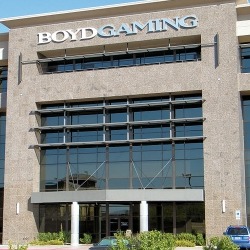Prior to the legalization of New Jersey online gambling, opponents of the new law suggested online casinos would cannibalize land-based operations. Keith Smith, CEO of Boyd Gaming, says 85% of his website’s customer base were not Borgata Casino customers prior to November 2013.
Boyd Gaming is partners with MGM Resorts in ownership of the Borgata Casino in Atlantic City. Together, the two gaming companies own and operate the Borgata Online Casino. In the early going since legalization, Borgata has been the number one online gaming operation in the State of New Jersey. Smith’s statistics belie the idea that online gambling simply takes the usual customer base out of the casinos and onto the computers.
Complimentary, Not Competitive
Keith Smith says the numbers are a clear indication that online and offline gambling are “complementary, not competitive”. Had customers simply stopped going to the brick-and-mortar casinos and simply started betting on their computer, this would have been no improvement for Atlantic City casinos. In fact, such a trend would have meant layoffs at the land-based casino, and therefore have been a net loss for New Jersey’s citizens.
The fact that the new form of play is attracting a whole other audience is therefore good news for the Atlantic City gambling establishment. Online gambling seems to be boosting the prospects of the Boardwalk casinos, even though the early numbers were disappointing to many. Some of the reasons for the disappointment have been fixed, though.
Not a Meaningful Contribution
During his talk with the media about the rollout for Borgata Online, the CEO of Boyd Gaming admitted the online business did not make a “meaningful contribution” to the Q4 numbers. While making the admission, Smith suggested reasons for optimism that will not always be the case.
Geolocation Problems Largely Fixed
A big reason for a slower start than expected was technology-based. The geolocator problem was a major impediment to all the online casinos. New Jersey officials chose to use a WiFi plugin to target where a gambler was located. These plugins were supposed to verify players were inside the state of New Jersey, but instead, they showed many players were outside the state.
Several inventive methods were used to fix the problem. For instance, reports indicated 888, Party Poker, and WSOP sent players who were having geolocation problems free WiFi adapters, also known as WiFi dongles. These fit into USB ports and strengthened the geolocation signal. Since the early rollout, many of these problems have been fixed in a permanent way, so Keith Smith expects fewer gamblers will be turned off by the early technical issues.
Mobile Casinos Being Added
Keith Smith noted that mobile gaming platforms are starting to become an option, which could open up a whole other avenue of legalized gaming for New Jerseyans. Android apps for 3G and 4G devices were introduced in February 2014, while an Apple iOS application should be ready “in the near future”. Roughly 60% of the smartphone users in New Jersey will be able to gamble using Android OS mobile phones. Soon enough, people with iPad tablet computers and iPhones also will be able to gamble using WiFi devices.
Because many game enthusiasts prefer mobile gaming to desktop and laptop computers, these technological upgrades should open licensed gambling to a whole other segment of the population. The under-30 crowd tends to prefer mobile gambling. Since many land-based casino gamblers tend to be a bit older, the influx of mobile gamblers should only help maintain the 85% statistics Boyd Gaming’s CEO has been trumpeting.
Payment Processing Being Fixed
Another issue players had in the early-going was the limited number of payment processing methods. Gamblers on the Internet need a variety of deposit and withdrawals options, given their various finances and privacy needs. Some players experienced issues with making payments or receiving cashouts in the beginning, which discourages continued play. When a gambler cannot get paid, they tend to stop playing with an operator.
These issues have been fixed as more payment processors have become comfortable with state-sanctioned online gambling in the United States again. There was a time a few years ago US online gambling accounted for more than 50% of the world market, but the 2006 UIGEA law put an end to the vast majority of American online gambling. Payment processors left the market, after a very famous case in which the co-founders of Neteller were arrested by American authorities.
Now, Neteller has announced a return to the US market. That’s a signal of the growing confidence in the system. When more web wallets and e-voucher companies join the system, gamblers who don’t want to add more payment methods will start to play.

